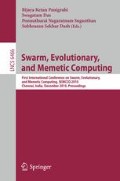Abstract
This paper presents a new computationally efficient improved stochastic algorithm for solving Optimal Power Flow (OPF) in interconnected power systems with FACTS devices. This proposed technique is based on the combined application of Fuzzy logic strategy incorporated in Particle Swarm Optimization (PSO) algorithm, hence named as Fuzzified PSO (FPSO). The FACTS devices considered here include Static Var Compensator (SVC), Static Synchronous Compensator (STATCOM), Thyristor Controlled Series Capacitor (TCSC) and Unified Power Flow Controller (UPFC). The proposed method is tested on single area IEEE 30-bus system and interconnected two area systems. The optimal solutions obtained using Evolutionary Programming (EP), PSO and FPSO are compared and analyzed. The analysis reveals that the proposed algorithm is relatively simple, efficient and reliable.
Access this chapter
Tax calculation will be finalised at checkout
Purchases are for personal use only
Preview
Unable to display preview. Download preview PDF.
References
Basu, M.: Optimal power flow with FACTS devices using differential evolution. Electrical Power and Energy Systems 30, 150–156 (2008)
Biskas, P.N., Bakirtzis, A.G.: ‘Decentralized security constrained DC-OPF of interconnected power systems’. In: IEE Proceedings Generation, Transmission and Distribution, vol. 151(6), pp. 747–754 (2004)
Chung, T.S., Ge, S.: Optimal power flow incorporating FACTS devices and power flow control constraints. In: IEEE Conference, vol. 98, pp. 415–419 (1998)
Ge, S.Y., Chung, T.S.: Optimal active power flow incorporating power flow control needs in flexible AC transmission systems. IEEE Transactions on Power Systems 14(2), 738–744 (1998)
Ge, S.Y., Chung, T.S., Wong, Y.K.: A new method to incorporate FACTS devices in optimal power flow. In: IEEE Conference, vol. 98, pp. 122–127 (1998)
Hingorani, N.G., Gyugyi, L.: Understanding FACTS: Concepts and Technology of Flexible AC Transmission Systems, The institute of Electrical and Electronics Engineers, New York (2000)
Lai, L.L., Ma, J.T.: Power flow control in FACTS using evolutionary programming. IEEE Transactions on Power Systems 95, 109–113 (1995)
Li, N., Xu, Y., Chen, H.: FACTS-based power flow control in interconnected power systems. IEEE Transactions on Power Systems 15(1), 257–262 (2000)
Padhy, N.P., Abdel-Moamen, M.A.: Power flow control and solutions with multiple and multi-type FACTS devices. Electric Power Systems Research 74, 341–351 (2005)
Padhy, N.P., Abdel-Moamen, M.A.R., Trivedi, P.K., Das, H.: A hybrid model for optimal power flow incorporating FACTS devices. IEEE Transactions on Power Systems 1, 510–515 (2001)
Poli, R., Kennedy, J., Blackwell, T.: Particle swarm optimization: An overview. Swarm Intelligence 1(1), 33–57 (2007)
Fukuyama, Y., Tahyama, S., Yoshida, H., Kawata, K., Nahnishi, Y.: A particle swarm optimization for reactive power and voltage control considering voltage security assessment. IEEE IRons. on Power Systems, 1232–1239 (2000)
Trelea, I.: The particle swarm optimization algorithm: Convergence analysis and parameter selection. Inf. Process. Lett. 85(6), 317–325 (2003)
Zheng, Y., Ma, L., Zhang, L., Qian, I.: On the convergence analysis and parameter selection in particle swarm optimization. In: Proc. Int. Conf. Machine Learning Cybern., pp. 1802–1807 (2003)
Liang, J.J., Suganthan, P.N.: Dynamic Multi-Swarm Particle Swarm Optimizer. In: IEEE Swarm Intelligence Symposium, Pasadena, CA, USA, pp. 124–129 (2005)
El-sharkh, M.Y., El-Keib, A.A., Chen, H.: A fuzzy evolutionary programming based solution methodology for security-constrained generation maintenance scheduling. Electric Power system Research 67, 67–72 (2003)
Author information
Authors and Affiliations
Editor information
Editors and Affiliations
Rights and permissions
Copyright information
© 2010 Springer-Verlag Berlin Heidelberg
About this paper
Cite this paper
Jothi Swaroopan, N.M., Somasundaram, P. (2010). Fuzzified PSO Algorithm for OPF with FACTS Devices in Interconnected Power Systems. In: Panigrahi, B.K., Das, S., Suganthan, P.N., Dash, S.S. (eds) Swarm, Evolutionary, and Memetic Computing. SEMCCO 2010. Lecture Notes in Computer Science, vol 6466. Springer, Berlin, Heidelberg. https://doi.org/10.1007/978-3-642-17563-3_56
Download citation
DOI: https://doi.org/10.1007/978-3-642-17563-3_56
Publisher Name: Springer, Berlin, Heidelberg
Print ISBN: 978-3-642-17562-6
Online ISBN: 978-3-642-17563-3
eBook Packages: Computer ScienceComputer Science (R0)

